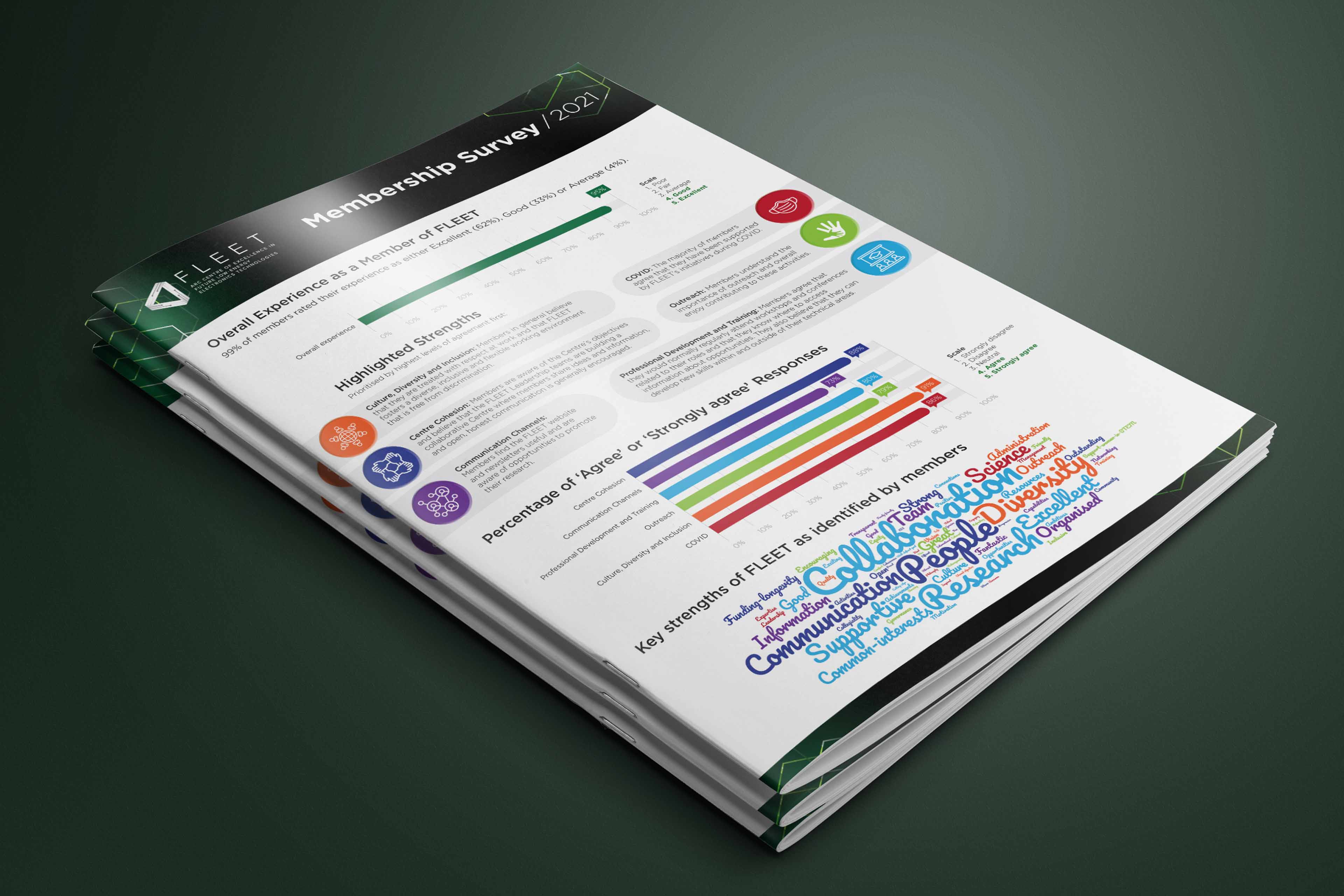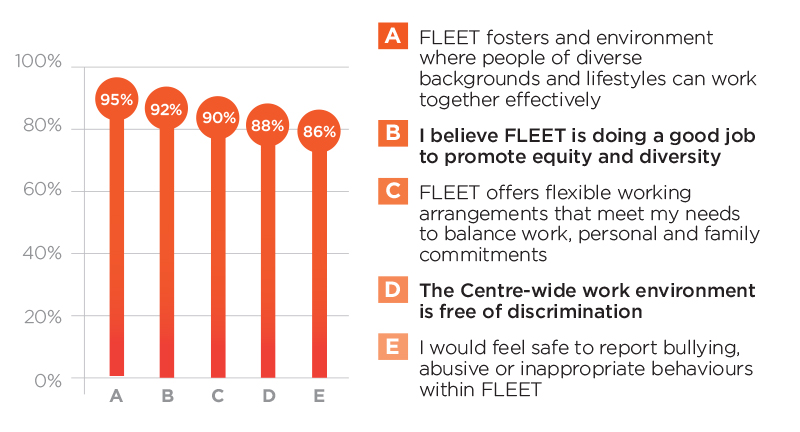Equity and diversity at FLEET
FLEET’s steps to improve women’s representation in physics, within the Centre and more widely, have also expanded to encompass wider definitions of diversity.
Diverse teams do better science. By increasing the diversity of our own team, and Australian science more widely, we are both doing what’s fair and improving our capacity to do great research.
In 2021, FLEET efforts to improve gender equity (see Women in FLEET) have been expanded to encompass wider definitions of diversity, increasing the representation of people from diverse backgrounds, and circumstances including Indigenous, LGBTIQA+, living with a disability or caring for a person with a disability, refugee, low-socioeconomic backgrounds. See more about FLEET’s new Diversity Fellowships and scholarships , the first such postdoctoral research fellowships in Australia.
As well as increasing the representation of people from all minority groups in STEM, FLEET’s main focusses in 2021 have been supporting our people through Covid-19, and further increasing the number of women at investigator levels.
Culture, Diversity and Inclusion
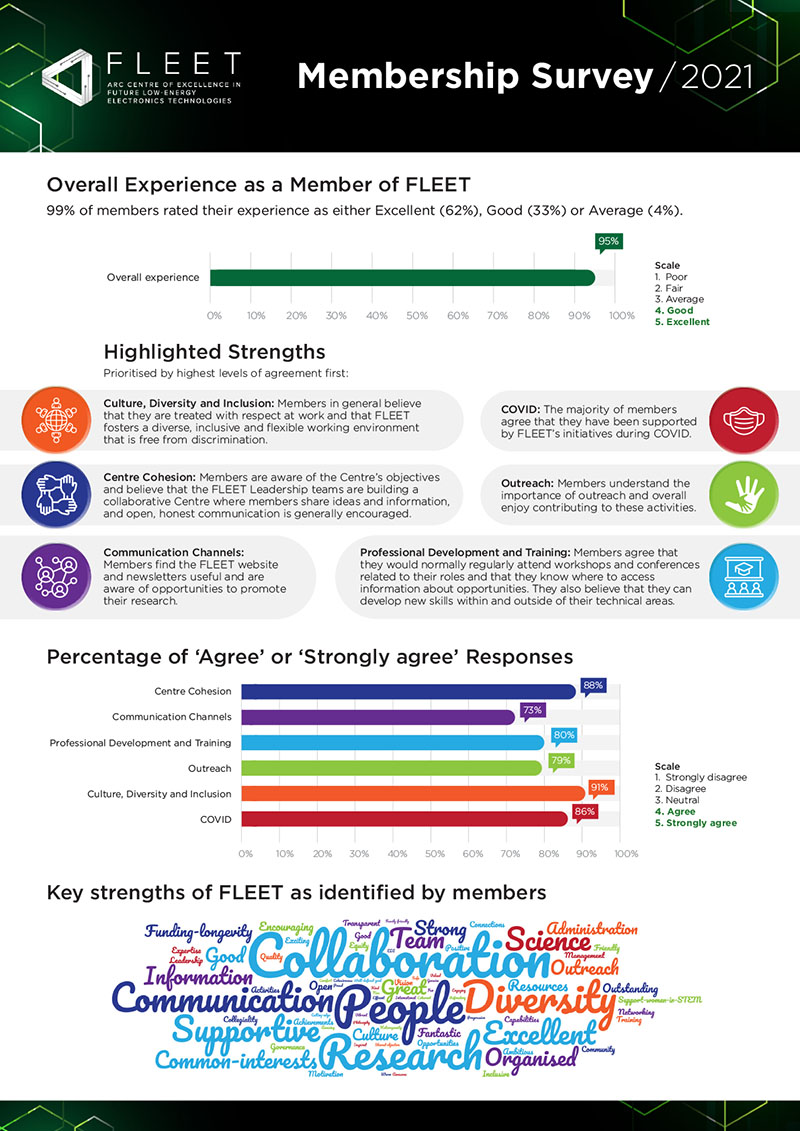
Click the image above to view the FLEET Membership survey results
FLEET has continued improvement in representation of women at higher levels, increasing female representation among the Centre’s advisers and liaisons who guide FLEET management and scientific directions from 21% in 2019 to 29% now. In addition, three new female scientific associate investigators were added to FLEET in 2021.
FLEET’s Women in FLEET Fellowships and strategic grants have allowed the Centre to increase the percentage of women at the associate investigator level to 38%, which is above the average in physics. At 25% of all members, the Centre is close to our ambitious target of 30% women at all levels but still has work to do.
In particular, fixing the infamous ‘leaky pipeline’ regarding gender equity in science involves both retaining female researchers and recruiting more. And while Centre initiatives have helped us retain women in 2020–21 (with the help of Women in FLEET scholarships and Fellowships), Covid-19 has continued to restrict our ability to recruit.
In addition to recruitment and career-support measures, FLEET has addressed low representation of women in physics and materials science by improving the work environment, which benefits all members.
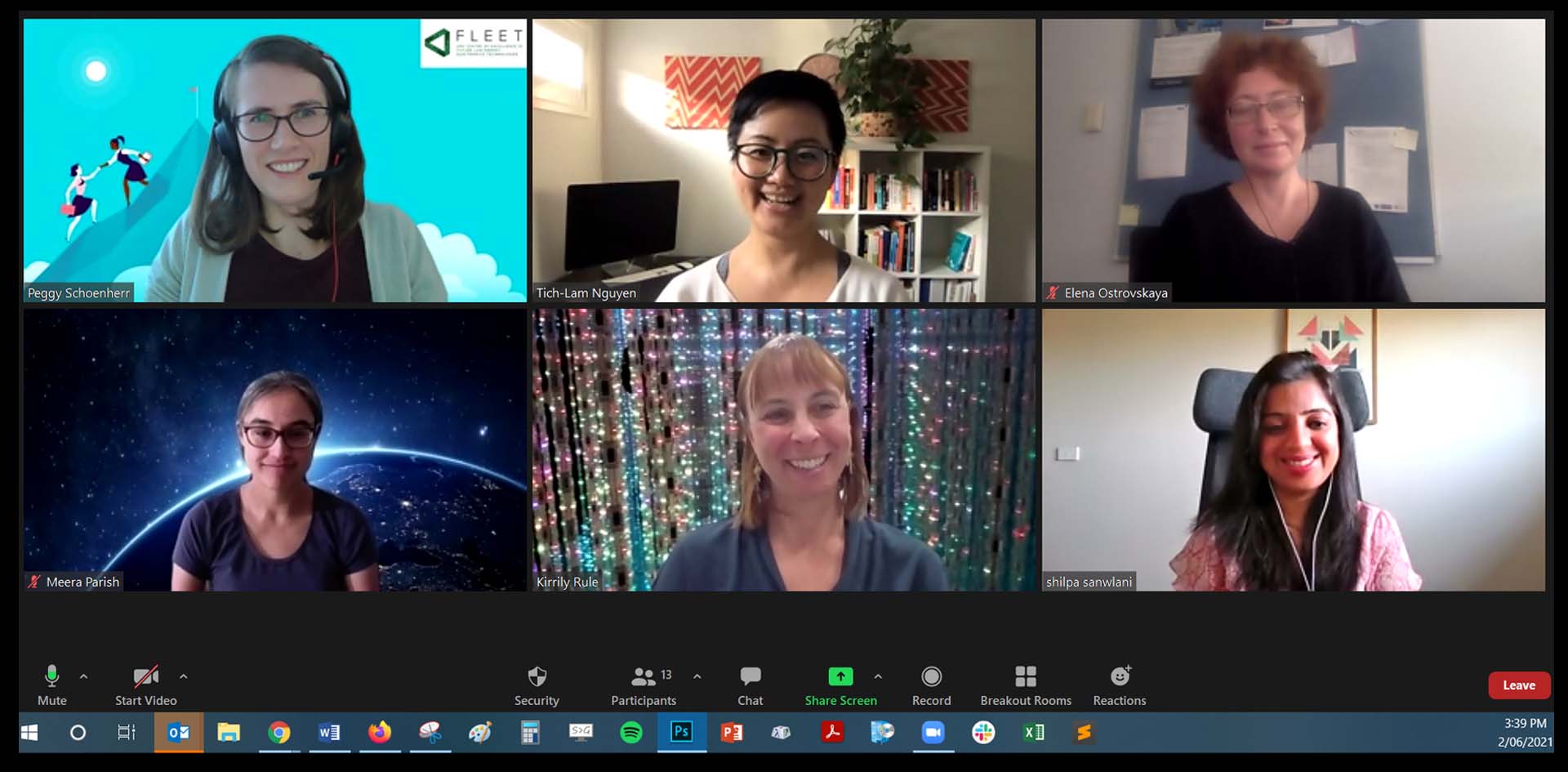
FLEET initiatives support researchers with caring responsibilities and provide on-site childcare at Centre-organised events, so members don’t have to compromise between research training opportunities and their responsibilities as a carer.
Such policies have lasting impact, making it ‘more normal’ for carers to attend scientific workshops.
FLEET’s family-friendly workshops are a real hit. There is a totally different vibe from a 'regular' conference and it really helps people connect on a more personal and human level.
FLEET Membership Survey
EQUITY AND DIVERSITY
HIGHLIGHTS IN 2021
- Adding Diversity in FLEET scholarships and Fellowships to Women in FLEET initiatives, aimed at increasing representation of people from diverse backgrounds and circumstances under-represented in Australian STEM
- Training our people to recognise and respond to unacceptable behaviours in the workplace
- Providing access to professional counselling services through an Employee Assistance Program
- Continuing to support our members through Covid, via write-up scholarships and other initiatives
- Confirming our influence on girls to considering studying physics in surveys following the FLEET–JMSS (John Monash Science School) Future Electronics unit (see case study).
FLEET’s investment in its people is paying dividends. Centre cohesion, Centre culture, diversity and inclusion have the highest levels of agreement in the all-member survey conducted by FLEET in early 2021 (see case study).

One of my highlights in 2021 was receiving personal feedback from members expressing thanks for the little things FLEET did to support them through Covid.
Dr Tich-Lam Nguyen Centre COO
- Help increase diversity in STEM in Australia
- Provide models for more-inclusive research collaboration
As a Centre of Excellence, FLEET has an opportunity to ‘change the culture’ and establish new best practices that have an effect beyond the Centre.
For example, after attending FLEET’s family-friendly all-Centre meetings, several visiting partners have returned to their own organisation to encourage similar models. FLEET has worked with organisers towards providing sponsor support for family-friendly assistance at a number of external events. FLEET’s Women in FLEET and Diversity in FLEET fellowships are being looked at by other research institutions.
Responses to Covid
Like all organisations in 2020–21, FLEET made significant changes in response to Covid, many of which will be adopted permanently. These include more flexible working arrangements, such as working from home, and less academic travel, which adversely effects both family life and the environment.
Many post-Covid initiatives have helped FLEET design new best practices for Centre collaboration, communication, education, engagement, and equity programs.
FLEET’s 2021 ‘Pandemic and you’ survey explored how our members were being impacted by Covid-19. Results showed that while the impacts of the pandemic were varied, they fell heaviest on caregivers and those in early in their career. As a result, the Centre has since:
- Created PhD write-up scholarships for students affected by the restrictions
- Offered several PhD candidature and postdoctoral contract extensions
- Encouraged regular check-ins from supervisors
- Supported eligible postdocs whose contracts were ending where possible
- Reduced the Centre's KPI contribution expectations from members
- Engaged with Employee Assistance Program Services to offer professional counselling services for FLEET members
- Maintained international links via ongoing trans-Pacific and trans-Tasman seminar series, and Asia-Pacific multiferroic conference (see case study Maintaining international research connections).
My uni gave me a grant to buy equipment to set up a home office. My supervisor helped me to develop a theory-based project during the lockdown in Melbourne. The business team helped me access a database I didn’t have access to at my home uni.
FLEET Member Survey Response
Even prior to Covid, FLEET’s annual internal surveys had shown that the mental health and work-life balance of many young researchers could be put at jeopardy by work stresses. The Centre’s 2020 and 2021 surveys confirmed that this risk had intensified.
FLEET’s concrete initiatives above have assisted in taking some work-related pressure off our people, but this is only part of the story. People are also affected by external issues such as isolation from friends and family, and fears concerning health and career.
Over 90% of respondents to a 2019 FLEET survey were aware of opportunities FLEET provides to help make it easier to balance work and family life.
FLEET has also sought to mitigate isolation challenges by offering an Employee Assistance Program where members can seek help from professional psychologists when they need to. Three members have accessed this service to date.

There are real opportunities here to do things better. There's a nice confluence of saving energy (less travel) and advancing equity (various kinds of flexible work arrangements are now on the table). FLEET also has an opportunity to ‘change the culture’, and establish new best practices.
Prof Michael Fuhrer Centre Director
To help FLEET become more aware of unconscious bias and other barriers to cultural and gender diversity and inclusion, each year every FLEET member must attend at least one training workshop or training session in equity, diversity and inclusion.
Equity-related training
Members may undertake any training and development opportunity of their choice, including face-to-face sessions, webinars or online modules. We believe that letting individuals select training that matches their personal situation and areas of interest will offset some of the ‘equity fatigue’ that can sometimes accompany mandatory training.
The FLEET website, intranet and newsletter provide links to resources and opportunities available at individual nodes, as well as those provided by FLEET partner the Diversity Council Australia (DCA), which provides a wide toolkit of knowledge programs, research, practical tools and events.
Centralised equity training in 2021 included the panel ‘What makes women strong in what they do?’ organised by FLEET Research Fellow Dr Peggy Schoenherr and featuring five FLEET women sharing their personal experiences. FLEET also ran Active bystander training, in conjunction with Monash University’s Respectful Communities unit.
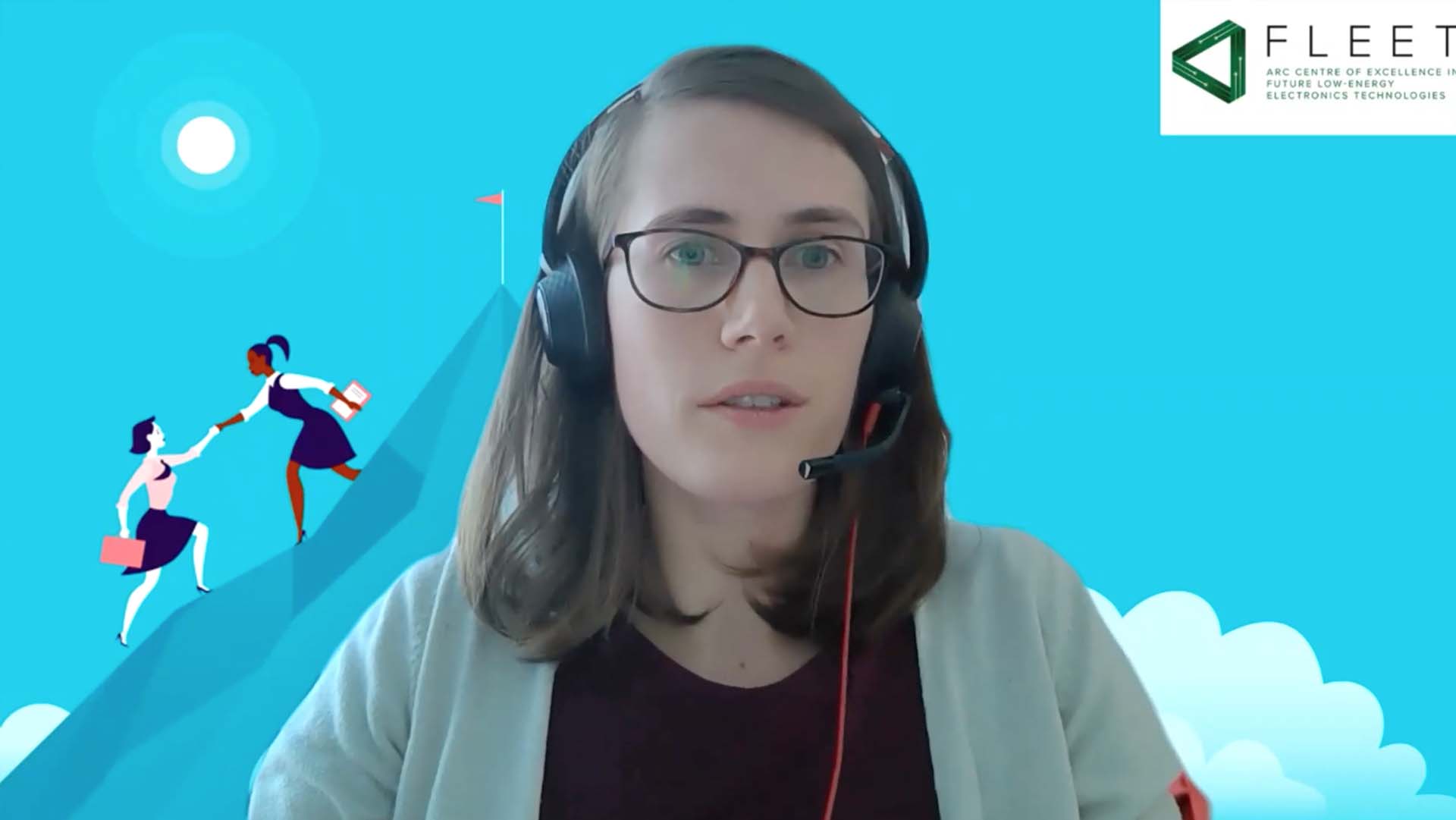
FLEET Associate Investigator Dr Peggy Schoenherr
To help members choose the training that best suits them, FLEET promotes Diversity Council Australia events. In 2021 they included a ‘masterclass’ on identifying and eliminating sexual harassment, a workshop on how to build workplace inclusion, and an information session on the Inclusion@Work Index.
FLEET members also participated in the following equity-and-diversity related training:
- Roses Among Thorns: Empowering women leaders in STEM and entrepreneurship organised by the Postgraduate Council UNSW
- An indigenous engagement workshop, organised by the University of Queensland School of Mathematics and Physics
- ‘Women in Science Network: Science Communication Panel’, organised by the University of Melbourne
- LGBTIQA+ Awareness and Empowering Allies Training.
